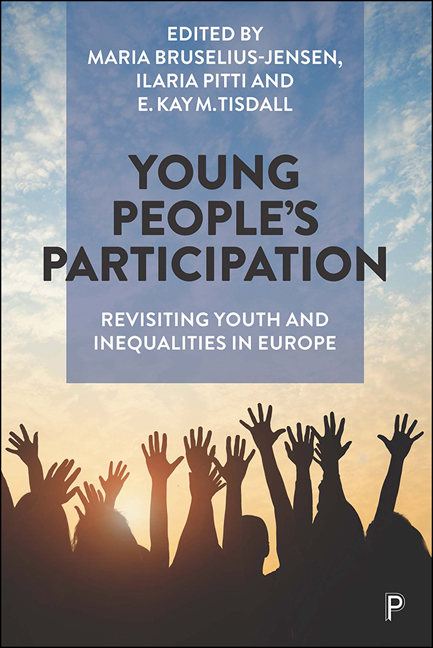Book contents
- Frontmatter
- Contents
- List of figures and tables
- Notes on contributors
- Acknowledgements
- 1 Revisiting young people's participation: an introduction
- PART I Young people's experiences of participation and engagement
- PART II Current state and conditions for young people’s participation: critiques and trends
- PART III Broadening participation: young people's own approaches to participation
- PART IV New opportunities for young people's participation: facilitating new forms of youth participation
- Index
9 - Young Italians and the crisis: emerging trends in activism and self-organisation
Published online by Cambridge University Press: 18 December 2021
- Frontmatter
- Contents
- List of figures and tables
- Notes on contributors
- Acknowledgements
- 1 Revisiting young people's participation: an introduction
- PART I Young people's experiences of participation and engagement
- PART II Current state and conditions for young people’s participation: critiques and trends
- PART III Broadening participation: young people's own approaches to participation
- PART IV New opportunities for young people's participation: facilitating new forms of youth participation
- Index
Summary
This chapter discusses young Italians’ political activation against the exacerbation of socioeconomic and intergenerational inequalities fostered by the 2008 economic crisis and the austerity measures. The study contributes to the book and to the broader scholarship in youth studies and social movement studies by providing an in-depth analysis of young people's collective reaction to inequalities through self-organisation and mutualism. The chapter is based on qualitative materials (interviews, focus groups and participant observations) collected on five experiences of youth activism in political squats (centri sociali). These materials are analysed in relation to three main research questions: how did the crisis transform activists’ practices of participation? How has this transformation changed the relationships between activists and the surrounding communities? And what about young activists’ relationships with institutions?
Key findings
• Practices of self-organisation let young people experiment with alternative solutions to their own problems, limiting young people's risk of disengaging with their communities because of experiences of inequalities.
• Practices of self-organisation, working at a small scale and focusing locally, foster interactions between young people and other local community members.
• Young people's interest and involvement in political issues are reinvigorated by the combination of small-scale actions with longterm political goals, even though young people may remain sceptical of institutional politics.
Introduction
This chapter presents emerging similarities in the reasons, aims and modes of political activation of young Italians against the growth of socioeconomic and intergenerational inequalities occurring in Italy following the 2008 economic downturn and the adoption of austerity measures by the national and European governments. The chapter considers a specific form of youth participation – namely self-organisation through squatting of public buildings (Mudu, 2012; Genova, 2018; Piazza, 2018) and contributes to the book by analysing young people's collective reaction to inequalities created or harshened by the austerity.
The chapter conceptualises ‘inequality’ in terms of uneven distribution of social resources and opportunities between generations, which has severely hindered young Italians’ possibilities of achieving economic independence and social integration (Chevalier, 2018) during the years of the crisis. The 2008 economic downturn, known as the Great Recession, and subsequent austerity measures have certainly led to a hostile landscape for Italian society as a whole.
- Type
- Chapter
- Information
- Young People’s ParticipationRevisiting Youth and Inequalities in Europe, pp. 139 - 156Publisher: Bristol University PressPrint publication year: 2021



